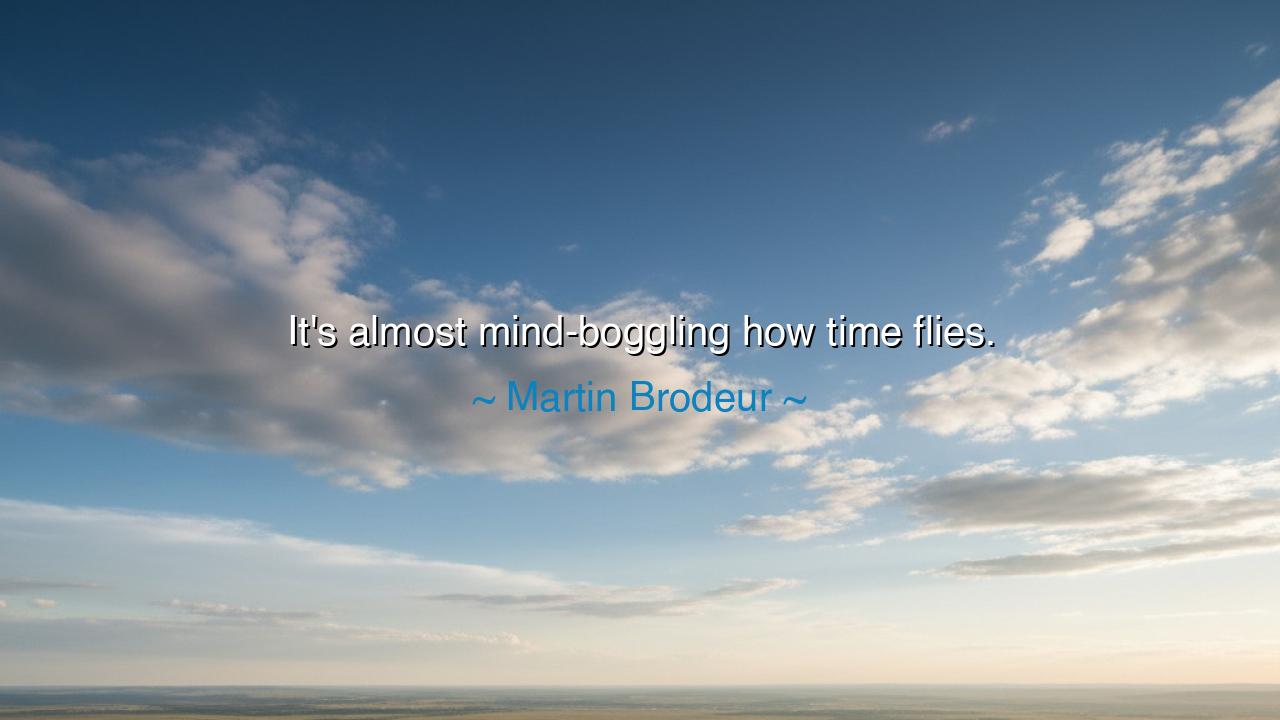
It's almost mind-boggling how time flies.






The words of Martin Brodeur, master of the ice and guardian of the net, carry a truth older than the mountains: “It’s almost mind-boggling how time flies.” In this simple utterance is a profound reminder that time, though unseen and untouchable, is swifter than any winged creature, faster than any flowing river. What seems long in the moment, when remembered, often feels like the blink of an eye. His words teach us that life is fleeting, and the seasons of our days pass with a swiftness that astonishes the heart.
The meaning of this saying is not to lament the passing of hours, but to awaken us to their value. The mind-boggling nature of time is that we scarcely notice its flight while we are in its stream. Children grow into adults, careers begin and end, victories and failures blur together, and one day we awaken to find that decades have vanished. Brodeur, reflecting on a long and illustrious career in hockey, speaks as one who looked back upon years of play and realized they had passed as swiftly as a gust of wind across the rink.
This truth has been echoed throughout the ages. The Roman poet Virgil wrote: “Fugit inreparabile tempus”—“time flies, never to be regained.” Across cultures and civilizations, sages and poets have struggled to grasp the fleeting nature of existence. What Brodeur experienced in the arena of sport is what every soul feels: the wonder and sorrow that time, once gone, can never be reclaimed. His words remind us that the swiftness of time is not just a mystery, but a call to live wisely.
Consider the story of Alexander the Great. By the age of thirty, he had conquered much of the known world. Yet on his deathbed, he wept—not for more lands to rule, but for more time. All his victories, all his treasures, could not buy him another year, another month, another day. For all men, whether kings or commoners, the same truth applies: the speed of time humbles all, and its wings spare none.
Thus, the teaching of Brodeur’s words is twofold: first, that life is shorter than we imagine, and second, that within that shortness lies its urgency and its beauty. To recognize that time flies is to awaken to the need to seize the present. It is to understand that waiting endlessly, hesitating, or wasting one’s days is to let the most precious of gifts slip through your fingers like sand.
The lesson, then, is this: treat each day as sacred, for it is part of a limited number. Do not dwell too long in regrets of yesterday, nor postpone too much for the tomorrow that may never arrive. Instead, act now, love now, create now, for in a breath, this moment will be gone. To be mindful of the swiftness of time is to honor its power and to refuse to waste what cannot be replaced.
Practical actions flow from this wisdom. Set aside time each day to cherish those you love, for one day they too will be gone. Pursue the work that stirs your spirit, for time does not wait for hesitation. Mark the passing seasons with rituals of gratitude, so that when you look back, your life will not feel like a blur, but like a tapestry woven with intention. In this way, though time flies, it will carry you not into emptiness, but into a legacy of meaning.
So remember, children of tomorrow: the swiftness of time may boggle the mind, but it need not rob you of joy. Instead, let it sharpen your vision, awaken your urgency, and deepen your gratitude. For though the days may pass like the flight of an arrow, you may yet fill them with love, courage, and remembrance—and in this way, the wings of time will not scatter you into dust, but lift you toward eternity.






AAdministratorAdministrator
Welcome, honored guests. Please leave a comment, we will respond soon